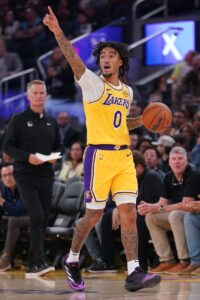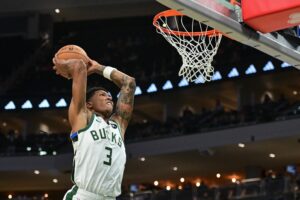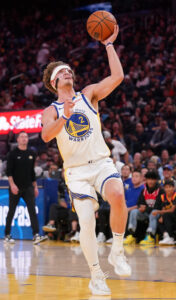Center Christian Koloko, who is on a two-way contract with the Lakers, recently received medical clearance from the NBA’s Fitness-to-Play panel to resume his career. The 24-year-old big man missed all of last season with a career-threatening blood clot issue, which his agent said was corrected with surgery.
While he received medical clearance from the league, Koloko still needs to work on his conditioning before having a chance to make his Lakers debut. According to head coach JJ Redick, Koloko will open the 2024/25 season with the South Bay Lakers, L.A.’s G League affiliate (Twitter link via Dave McMenamin of ESPN).
Here’s more on the Lakers:
- The Lakers chose to decline their 2025/26 team option on second-year guard Jalen Hood-Schifino, which means he’ll be an unrestricted free agent next offseason. As ESPN’s Bobby Marks notes (via Twitter), the Lakers have $176MM in salary committed to their roster for next season, about $10MM below the projected luxury tax line. That means they could have access to the non-taxpayer mid-level exception in 2025, with D’Angelo Russell, Christian Wood and Jaxson Hayes among the team’s other free agents.
- After opening the season with three straight home victories, the Lakers have now dropped two straight road contests. As Dan Woike of The Los Angeles Times writes, Wednesday night was LeBron James‘ worst loss in Cleveland against his former team, the Cavaliers, with the Lakers losing by 24 points. James grew up 35 miles south of Cleveland in Akron, OH. “I just don’t think we matched their intensity with energy and effort,” James said. “It’s never good to take a step backwards, but we did that. And now we got to figure out how we can, take two steps forward next time.”
- The lopsided victory had Cavs fans chanting to see another Akron product, according to McMenamin of ESPN. James’ eldest son Bronny James scored his first NBA points late in the fourth quarter. “It was insane,” Bronny said of the reception after finishing with two points, two assists and one steal in five minutes. “Much more than I anticipated for sure. But it’s all love. It was insane. It was a nice moment. The chants really got me. I was straight-faced, but I felt it and it felt really good, especially coming from here. Yeah, it was a special moment for me for sure.”
- The Lakers appreciated that Redick took private and public responsibility for the team’s first loss on Monday in Phoenix, per Khobi Price of The Southern California News Group. That doesn’t mean the team agreed with Redick’s assessment, but the players respected the sentiment. “He let out a nice little F word, which just shows how much he cares,” guard Austin Reaves said of Redick’s post-game demeanor. “His passion is on another level. You can tell every single second of every day that he’s locked into the betterment of our group.”
 The option, which was for the 2025/26 season, was valued at $4,064,640. The Lakers — or whichever team Hood-Schifino finishes this season with — will be limited to offering him that figure in free agency, but rival suitors could theoretically exceed that total.
The option, which was for the 2025/26 season, was valued at $4,064,640. The Lakers — or whichever team Hood-Schifino finishes this season with — will be limited to offering him that figure in free agency, but rival suitors could theoretically exceed that total. As
As  His $3,687,960 salary for the 2025/26 season is now guaranteed, with the team holding a fourth-year option for ’26/27 valued at $5,679,459.
His $3,687,960 salary for the 2025/26 season is now guaranteed, with the team holding a fourth-year option for ’26/27 valued at $5,679,459.